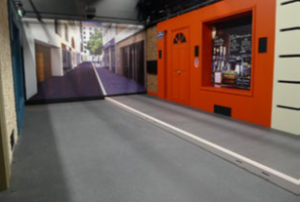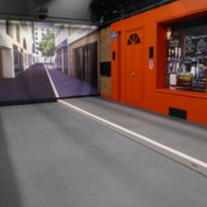A belief held by Dr. José-Alain Sahel, University of Pittsburgh Department of Ophthalmology Chairman, is that, to best help a patient as a whole being, and not just consider the condition which limits their sight, we need to radically reconceptualize the way we deliver care.
How We Reconceptualize Care
 It starts, we believe, by listening. According to Dr. Sahel, “we work hand in hand with an individual to understand what their life with vision loss is like; we formulate a multifaceted plan to turn their struggles into opportunities. Our experience with this model tells us that we need experts from many fields, in addition to ophthalmology, to tackle larger issues such as workplace accessibility, mobility, and overall independence and quality of life.” A need has been identified for such a platform to ensure that these activities and resources are coordinated efficiently and effectively, with the ability to look outward to see how what we learn can apply to people living with vision loss both locally and globally.
It starts, we believe, by listening. According to Dr. Sahel, “we work hand in hand with an individual to understand what their life with vision loss is like; we formulate a multifaceted plan to turn their struggles into opportunities. Our experience with this model tells us that we need experts from many fields, in addition to ophthalmology, to tackle larger issues such as workplace accessibility, mobility, and overall independence and quality of life.” A need has been identified for such a platform to ensure that these activities and resources are coordinated efficiently and effectively, with the ability to look outward to see how what we learn can apply to people living with vision loss both locally and globally.
A Unique Laboratory
 To meet this need, experts at the University of Pittsburgh have joined together to enable patients with low-vision or blindness to live independently and be active in their community. Dr. Sahel, along with Associate Professor of Bioengineering, Ophthalmology and Physical Therapy Rakié Cham, PhD and Professor of Bioengineering, Physical Therapy, and Health and Rehabilitation Sciences Mark Redfern, PhD, is developing a unique laboratory facility to support the mission of improving lives of individuals with low vision and blindness. This laboratory is based on the multi-functional resource known as the StreetLab. The first StreetLab was built in Paris to help researchers understand how patients experience the neurophysiological perceptual and cognitive aspects of vision in real-time. The StreetLab is a state-of-the-art technological platform that allows clinicians, researchers, and patients to interact and to model real-life situations where vision loss is a factor in a fully monitored and controlled environment.
To meet this need, experts at the University of Pittsburgh have joined together to enable patients with low-vision or blindness to live independently and be active in their community. Dr. Sahel, along with Associate Professor of Bioengineering, Ophthalmology and Physical Therapy Rakié Cham, PhD and Professor of Bioengineering, Physical Therapy, and Health and Rehabilitation Sciences Mark Redfern, PhD, is developing a unique laboratory facility to support the mission of improving lives of individuals with low vision and blindness. This laboratory is based on the multi-functional resource known as the StreetLab. The first StreetLab was built in Paris to help researchers understand how patients experience the neurophysiological perceptual and cognitive aspects of vision in real-time. The StreetLab is a state-of-the-art technological platform that allows clinicians, researchers, and patients to interact and to model real-life situations where vision loss is a factor in a fully monitored and controlled environment.
The Pittsburgh StreetLab
To build on the success of the Paris StreetLab, we have begun to develop plans for a more technologically-advanced StreetLab in the new Vision Institute building in Pittsburgh. This core facility will allow for the collaboration of teams already in place here at the University of Pittsburgh. Dr. Sahel’s team of experts is focused on all the fields where autonomy and accessibility for visually impaired people require improvement: housing, mobility, access to services, and work environment. The StreetLab can allow for the reproducing low vision symptoms and modeling in an urban area and a housing environment. It is comprised of: an urban experimental area that mimics the urban setting of Pittsburgh, the “Homelab”; a model apartment, used for reproducing a real living environment and enabling programs to improve the home lives of visually impaired people, and finally, the Artificial Street: an indoor platform offering a realistic immersion in an artificial urban area.
The StreetLab will revolutionize the way we identify and evaluate a patient’s needs and barriers to independent living at home, work, and community. We will utilize healthcare specialists who are experts in conducting patient interviews and surveys. From this, we can evaluate function in specific domains and various environments, such as the home or the workplace. Additionally, we know that patients with low vision use a variety of medical therapies and/or visual assistive devices. Another goal of the StreetLab is to measure the efficacy of these interventions and to develop metrics for evaluating training, new technologies, and their impact on a patient’s performance. Finally, we hope that the StreetLab will assist our team members in the development of new and innovative solutions. An essential part of replicating the StreetLab platform is the ability if gives our faculty and researchers to be able to partner with companies to improve, adapt and extend existing interventions based on what we learn from patients and their experiences.
The StreetLab project will involve a multidisciplinary team, from experts across the therapeutic field. Specialists in low vision and occupational therapy, including Dr. William Smith, OD, Holly Stants, MS, OTR/L, and Elizabeth Skidmore, PhD, OTR/L, FAOTA, FACRM work together with the engineers to assess visual and neurological impairment and design appropriate protocols for patients with all types of needs. Finally, the StreetLab will leverage partnerships with local organizations, such as Blind and Vision Rehabilitation Services, to ensure that the services it can provide for evaluation of therapies are available to all people living with vision loss. The first generation of this project has been generously funded with support from the Jack Buncher Foundation.
To stay up to date on future events and news, follow EEF on Facebook, Twitter, and LinkedIn and subscribe to our Sight + Sound Blog. To support the treatment innovations that are improving care, make a donation to the Eye & Ear Foundation.
